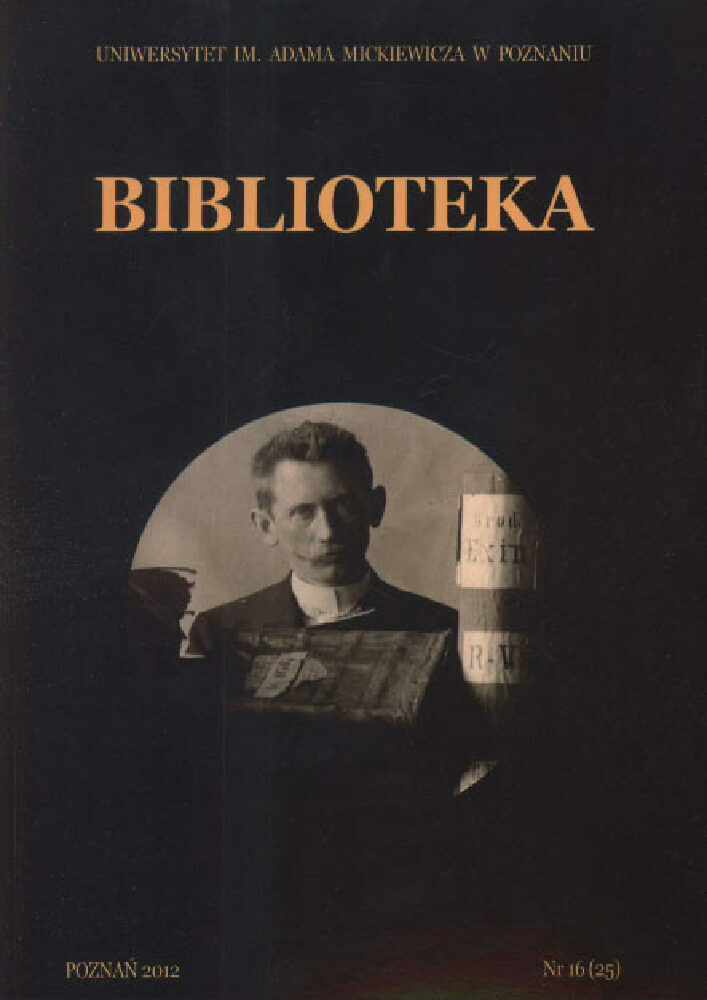Abstrakt
Celem artykułu jest przedstawienie oceny możliwości, którymi dysponują biblioteki akademickie, naukowe i narodowe, a które mogą być wykorzystane dla podtrzymania oferty usług i infrastruktury oraz oferowanych udogodnień w trudnych czasach kryzysu, spadku koniunktury ekonomicznej i towarzyszącej im finansowej zapaści. Autor przedstawia dostępne metodologie i istniejące możliwości pozostające nadal w zasięgu bibliotek i stoi na stanowisku, że nawet czasy kryzysu można wykorzystać właściwie, wszystkie bowiem zagrożenia, jakie niosą ze sobą, zawierają ukryte szanse, których nie wolno zmarnować. Zasadnicza część artykułu została wygłoszona podczas dziesiątego corocznego spotkania członków specjalnego konsorcjum EIS Z, które odbyło się 2 grudnia 2011 roku w Budapeszcie. W tekście wykorzystano także spostrzeżenia, które znalazły się w referacie Biblioteki akademickie a kryzys finansowy: strategie przetrwania, przedstawionym w Salonikach w Grecji 14–15 listopada 2011 roku podczas dwudziestej ogólnokrajowej konferencji greckich bibliotek akademickich. Obie prezentacje dostępne są w UCL Discovery. Niniejszy artykuł omawia problematykę poruszoną w obu prezentacjach, a także wprowadza nowy temat – reformę prawa autorskiego. Autor przedstawia ogólny kontekst ekonomiczny, w jakim przyszło funkcjonować europejskim bibliotekom naukowym, a następnie szczegółowo omawia możliwości bibliotek, których wykorzystanie może pomóc w przezwyciężeniu zagrożeń, jakie niesie ze sobą obecny kryzys finansowy. Wspólne pozyskiwanie zbiorów bibliotecznych jest jednym ze sposobów, dzięki którym biblioteki mogą osiągnąć optymalne dostosowanie kosztów do struktury przychodów, a autor dokładniej analizuje rolę, jaką w Zjednoczonym Królestwie odgrywa JIS C Collections (organizacja zajmująca się dostawą materiałów cyfrowych do celów edukacyjnych i badawczych w imieniu uczelni wyższych). Współpraca i współdzielenie usług to kolejne sposoby, dzięki którym biblioteki mogą wprowadzać innowacje i oszczędzać, dzieląc ciężar kosztów na zasadach partnerstwa. W artykule podano dwa konkretne przykłady takiego rozwiązania: pierwszy, który jest już znany i zyskał dobrą opinię – portal DART-Europe udostępniający prace doktorskie i dyplomowe w formie elektronicznej na zasadach open access; drugi, który znajduje się dopiero w fazie wstępnych dyskusji i planowania – rozwiązanie oparte na chmurze obliczeniowej dla prawdziwie zespołowego katalogowania z udziałem brytyjskich bibliotek naukowych i narodowych. The European Research Area (ERA) oraz wkład, jaki biblioteki mogą wnieść do tej infrastruktury przez finansowanie innowacyjnych projektów unijnych, przeanalizowano bardziej szczegółowo, koncentrując się na pakiecie unijnych projektów zainicjowanych przez LI BER. Wreszcie, pozytywną zmianę i dalszy wzrost można osiągnąć przez zmiany w kontekście prawnym, stąd w artykule znalazło się miejsce na analizę tzw. raportu Hargreavesa, dotyczącego kontekstu i struktury prawa autorskiego w Zjednoczonym Królestwie, oraz powstania nowej unijnej inicjatywy bibliotecznej, tj. grupy lobbującej na rzecz reformy prawa autorskiego – Information Sans Frontières (IS F).Bibliografia
Ayris P., Establishing the Library Landscape in Europe: LIBER’s Portfolio of EU projects, „LI BER Quarterly” 2011, t. 21.
„Economist”, 26.05.2011.
Estelle L., Big Deals and Alternative Business Models, wykład wygłoszony podczas dorocznego spotkania dyrektorów ds. informacji na uniwersytetach zrzeszonych w LERU (League of European Research Universities) w roku 2011, dostępny pod adresem: http://www.leru.org/index.php/public/extra/cio-28112011/.
Executive Summary (sprawozdanie dla zarządu).
Hill R., Moyle M., Investigating the Impact of e-Theses at DCU, prezentacja przedstawiona na dorocznej konferencji bibliotek zrzeszonych w LI BER w 2010 roku (LI BER Annual General Conference), http://discovery.ucl.ac.uk/19955.
http://ec.europa.eu/research/science-society/document_library/pdf_06/open-access-report-2011_en.pdf.
http://informationsansfrontieres.eu/.
http://www.dart-europe.eu/About/info.php.
http://www.dart-europe.eu/browse-list.php?index=institution, http://www.darteurope.eu/browse-list.php?index=country.
http://www.d-nb.de/eng/wir/projekte/ode.htm.Ayris
http://www.eua.be/eua-work-and-policy-area/research-and-innovation/Open-Access.aspx.
http://www.europeana-libraries.eu/.
http://www.guardian.co.uk/world/2011/dec/26/euro-crisis-2012-eurozone?INTCMP=SRCH.
http://www.ipo.gov.uk/ipreview-finalreport.pdf.
http://www.leru.org/files/publications/LERU_AP8_Open_Access.pdf.
http://www.ucl.ac.uk/news/staff/staff-news/05122011-mbrowne?dm_i=UAA.
http://www.webometrics.info/top100_continent.asp?cont=europe.
Licencja
Prawa autorskie (c) 2012 Paul Ayris

Utwór dostępny jest na licencji Creative Commons Uznanie autorstwa – Na tych samych warunkach 4.0 Miedzynarodowe.
Utwory opublikowane w czasopiśmie Biblioteka, na platformie Pressto należącej do Uniwersytetu im. Adama Mickiewicza w Poznaniu od 2015 roku są udostępniane na
licencji Creative Commons Uznanie autorstwa-Na tych samych warunkach 4.0 Międzynarodowe.
Tym samym wszyscy zainteresowani są uprawnieni do korzystania z utworów opublikowanych po 2015 roku pod następującymi warunkami:
- uznania autorstwa czyli obowiązek podania wraz z rozpowszechnianym utworem informacji o autorstwie, tytule, źródle (odnośniki do oryginalnego utworu, doi) oraz samej licencji
- na tych samych warunkach — remiksując utwór, przetwarzając go lub tworząc na jego podstawie, należy swoje dzieło rozpowszechniać na tej samej licencji, co oryginał.
Uniwersytet im. Adama Mickiewicza w Poznaniu zachowuje prawo do czasopisma jako całości (układ, forma graficzna, tytuł, projekt okładki, logo itp.).
Autor zachowuje prawa majątkowe, ale udziela zgody Uniwersytetowi im. Adama Mickiewicza w Poznaniu na wykorzystanie dzieła. Autorzy tekstów zakwalifikowanych do publikacji proszeni są o wypełnienie podpisanie i przesłanie umowy.
Jeżeli autor artykułu nie jest przekonany, że może wykorzystywać cudze utwory (np. ilustracje, fotografie, tabele) w ramach cytatu we własnej tekście musi dostarczyć do redakcji czasopisma zgodę od uprawnionych podmiotów.
Prawa są zastrzeżone do wszystkich tekstów opublikowanych przed rokiem 2015.





